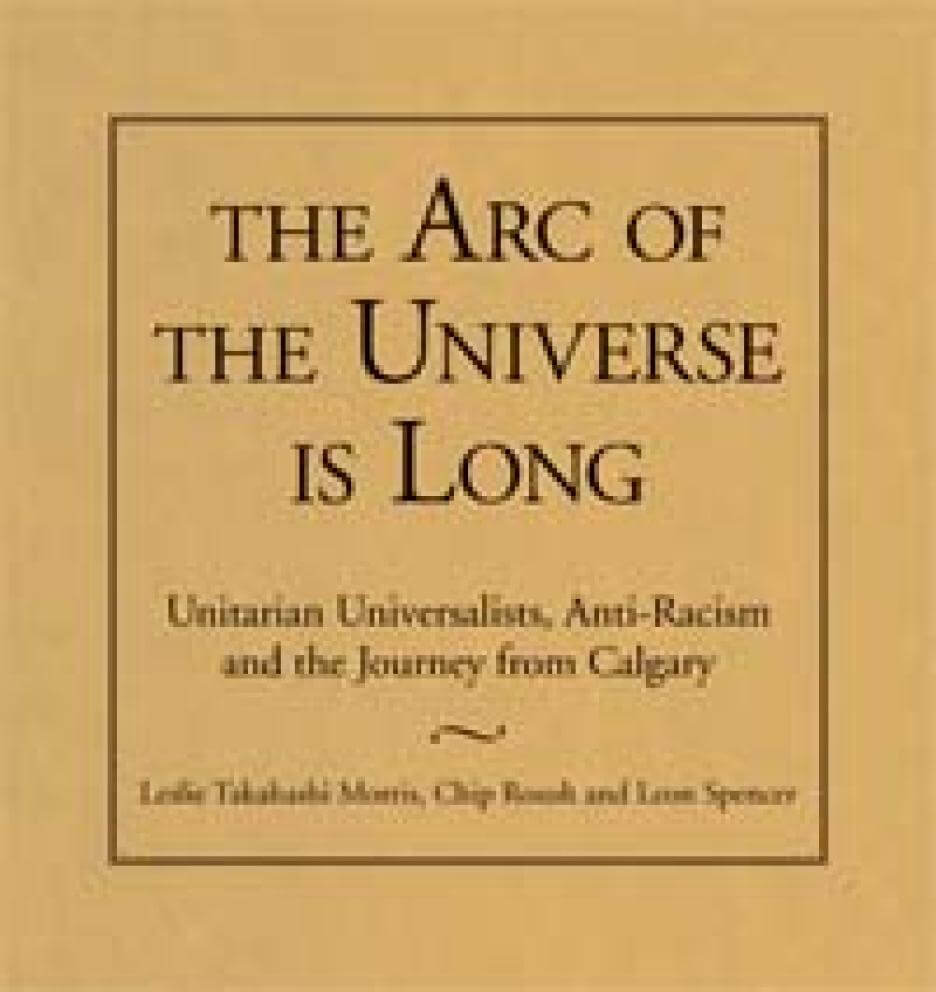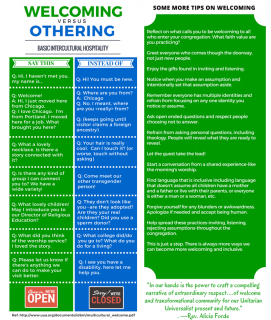Multicultural Transformation
Unitarian Universalists have desired to have diverse and multicultural congregations for decades. As we know, true diversity is uncommon because the vast majority of our congregations have cultural norms that are White, and primarily White Anglo-Saxon Protestant (WASP). White UUs have been slowly developing their awareness of racism—not just in its overt, Jim Crow and White Supremacist (e.g., KKK) forms—but in its more insidious forms of institutional racism, micro-aggressions, and the like.
We invite white congregational leaders to better understand how the norm of “Whiteness” affects our ability to be a spiritual home for those who don't represent historical UU cultural norms. We invite white leaders to develop the sensibilities and skills that will enable them show up meaningfully and authentically for racial justice. Here are a few resources that we hope will be helpful:
The Back Story: Our Denominational and National History
- Why start with history? In her online curiosity circles discussing the #UUWhiteSupremacyTeachIn in May of 2017, Rev. Renee Ruchotzke found that when white people heard the stories of how the UUA has been struggling with institutional racism, but in more complex and engaged ways as leaders learned from mistakes, they could see themselves in the story and became more hopeful.
- Article: The UUA Meets Black Power: BAC vs. BAWA, 1967–1971. by Warren R. Ross, UU World. A short overview of the tragic events that started the UUA's struggle with racism.
- Documentary: Wilderness Journey: The Struggle for Black Empowerment and Racial Justice within the UUA 1967-1970 (YouTube) (1:16:10) Ron Cordes's compelling oral history comprised of interviews of several Unitarian Universalist leaders who were involved in the Black Empowerment Controversy.
- Article: The black hole in the white UU psyche by Mark-Morrison-Reed, UU World. What is the consequence of not knowing Unitarian Universalism’s black history? We have embraced a false narrative about who we are.
- Sermon: Disrupting White Supremacy (September 2019) by Rev. Dr. Colin Bossen. Disrupting white supremacy is not about people who choose to be in solidarity with black and brown people out of some noblesse oblige. It is about understanding that we are in a period of profound crisis and that the white supremacist narratives found in the Doctrine of Discovery--the myth that the land can belong to anyone, the myth that we are racially different--must be disrupted if we are to survive that crisis.
- Visual Timeline (Image): This timeline was created spontaneously at the May, 2017 gathering in support of the Commission on Institutional Change in Atlanta, GA. It is not meant to be a definitive historical document, but does provide a visual overview of the struggle for racial justice in Unitarian Universalism.
- 2-3 Hour Workshop: Responding to Calls for Black Empowerment: Resistance and Transformation, Workshop 12 (by Rev. Julia Hamilton and Rev. Colin Bossen, (© UUA 2011) This workshop examines how the 1960s "Black Power" movement affected our religious movement by focusing on two narratives—one the story of a congregation and one of the Unitarian Universalist Association. Both were torn apart by the pressures and tensions that arose as a result of their responses to the events of the time.
- Book: The Arc of the Universe Is Long: Unitarian Universalists, Anti-Racism and the Journey from Calgary The recent history of the UUA's journey toward becoming an anti-racist, anti-oppressive, multicultural movement covers the fourteen years that begin with the passage of the racial and cultural diversity resolution at Calgary, in Canada, in 1992 and traces developments through General Assembly 2006. Using interviews and written records, the authors bring to life the voices and stories that represent many perspectives, all addressing issues of race and ethnicity in our congregations and our association. A study guide (PDF) by Leslie Takahashi is available. A GA Workshop by the authors is also available.
- Resource Page: The Doctrine of Discovery and the Rights of Indigenous Peoples: a UUA collection of resources for individual and group exploration of colonialism, white supremacy, our past, and our present. Includes links to workshops, books, and videos. Curated by Gail Forsyth-Vail.
- Book: Read the classic The Warmth of Other Suns: The Epic Story of America's Great Migration by Isabel Wilkerson to learn about the experiences of African Americans who fled from the Jim Crow South only to discover more insidious forms of racism in the North. Study Guide (PDF)
Culture and What It Means to Develop Intercultural Competence
- On-Demand Online Course: Co-Creating Diversity, Inclusion, and Equity in our Congregations
How do we interact across difference in a way that promotes diversity, inclusion and equity in our congregations that builds deep relationship and an inviting congregational culture? Intercultural Organizational Development Consultant Beth Zemsky shares how we can use a tool called the Intercultural Development Continuum as part of faith development in our congregations.
- On-Demand Online Course: Intercultural Skills for a Diverse World Each of us has culture–conscious and unconscious ways of being in the world. To become a truly multicultural faith, we need leaders who can build relationships effectively across difference including ethnicity, class, sexual orientation, gender, and more. Learn about a model of understanding cultural competence which will help you learn these skills. This training is ideal for both congregations that have racial and ethnic diversity and congregations who perceive themselves to be homogenous.
How Can We Expand Our Congregation's Understanding of Multiculturalism?
- Read the Book: Unitarian Universalists of Color: Stories of Struggle, Courage, Love and Faith to experience recent stories by fifteen Unitarian Universalists of color.
- Resource Page: Introduction to Multiculturalism: an overview of what it means to be a multicultural UU community, from UUA Multicultural Growth and Witness (MGW).
- Resource Page: Keep Talking, Start Doing: 10 Ways to Deepen Your Congregation’s Multiculturalism Journey, by Taquiena Boston, UUA Director of MGW.
- Resource Page: Engaging in Multicultural Ministry: introductory, intermediate, and advanced UU resources to help increase intentional multicultural ministry.
- Resource Page: Multicultural Welcome: A Resource for Greeters (PDF): a 2011 guide produced by the UUA MGW that engages and empowers greeters, who are often the first people visitors encounter, to embody our inclusive UU values. By Janice Marie Johnson, Rev. Alicia Forde, Susanna Whitman, and India McKnight. Printable Card for Greeters (Image)
- Resource Page: Considerations around Cultural (Mis)Appropriation: a collection of resources to help congregations be in respectful relationship with the religions and cultures from which they borrow.
- Community: Attend the Mosaic Makers Conference, an annual gathering and learning community for teams from congregations deeply engaged in the work of building intentional multicultural community.
Creating Spaces for Authentic Dialogue and Anti-Racist Transformation
- Curriculum: Offer Building the World We Dream About, by Dr. Mark Hicks, a 24-session curriculum, to interrupt the workings of racism and transform how people from different racial/ethnic groups understand and relate to one another. The program creates opportunities for commit to new, intentional ways of being. Can be adapted and conducted in 12 sessions.
- Curriculum: Offer Building the World We Dream About for Young Adults, an 8-session version of the above, adapted for the lives and perspectives of young adults (ages 18-35)
- Resource Page: Use resources curated by the Black Lives of UU for the #UUWhiteSupremacyTeachIn.
- Multi-Day Workshop: Sign up for Beloved Conversations, An experiential curriculum that provides a space to re-form/fuse the brokenness of racism into new patterns of thought and behavior ushering in social and spiritual healing. The program consists of a 1.5-day retreat, facilitated by a Fahs Collaborative staff person, that launches the curriculum, followed by 8 two-hour sessions of guided dialogue and experiential exercises facilitated by members of the congregation.
- Multi-Day Workshop: Take the Richmond Pledge to End Racism, a personal pledge based on the Birmingham Pledge "To eliminate racism and prejudice, all over the world, one person at a time." Since no one person can dismantle systemic and institutional racism working alone, this program provides a community-wide effort to address racism in all its forms. Its goal is to develop confidence and competence in identifying and addressing issues of racism wherever it lives.
- Book: Read Uprooting Racism: How White People Can Work for Racial Justice by Paul Kivel. The essential guide to understanding and confronting institutionalized racism.
Becoming a White Ally/Accomplice
- Community: Join Allies for Racial Equity, to confront racism in ways that are accountable to communities of color, that understand whiteness and privilege and help members to unlearn and challenge white supremacy.
- Curriculum: Offer Examining Whiteness: An Anti-Racism Curriculum by Rev. Dr. William Gardiner. With sections for individuals and for facilitators, this six-session curriculum covering: “The History of White Supremacy in the United States,” “The Emotional Lives of White People,” “Racial Identity Development,” “Racial Identity Journey,” “White Power and Privilege,” and “Developing a Positive White Identity.”
- On-Demand Online Course and Curriculum: Offer White Privilege: Let’s talk. A Resource for Transformational Dialogue, from the United Church of Christ, a program that's designed to invite church members to engage in safe, meaningful, substantive, and bold conversations on race.
- 2-3 Hour Workshop: An Ethic of Risk What We Choose, Workshop 9, (by Rev. Manish Mishra-Marzetti and Rev. Amber Beland, (© UUA 2012) This workshop introduces and considers UU theologian Dr. Sharon Welch's ethic of risk, which includes a redefinition of responsible action, grounding in community, and strategic risk-taking. She challenges us to form communities of accountability with people of different perspectives, values, and mores.
- Book: Read the memoir Waking Up White: And Finding Myself in the Story of Race by Debby Irving. After decades of sensing inexplicable racial tensions in her personal and professional relationships and worrying about offending people she dearly wanted to befriend, the author had an "aha!" moment that launched an adventure of discovery and insight that drastically shifted her worldview and upended her life plan. In Waking Up White, Irving tells her often cringe-worthy story with such openness that readers will turn every page rooting for her-and ultimately for all of us. Study Guide (PDF).
Confronting Linked Oppressions
- 2-3 Hour Workshop: Understanding Ethics from the Margins: What We Choose, Workshop 8, (by Rev. Manish Mishra-Marzetti and Rev. Amber Beland, (© UUA 2012) This workshop in our UU ethics series introduces three scholars of the late 20th and early 21st century who challenge the moral thinking of the dominant U.S. culture, a culture that ignores the collective social dimension of oppression and influences moral norms in ways that ignore (or even foment) oppression.
- 2-3 Hour Workshop: Working for Safety and to End Oppression (PDF): A workshop in the Safe Congregation Handbook.




